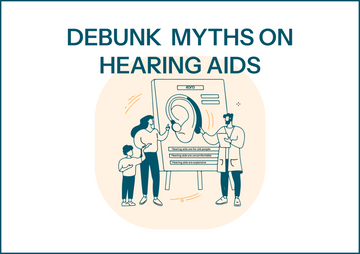Hearing loss affects millions of people worldwide, often developing gradually until it significantly impacts daily life. Early intervention is crucial; it can improve communication, emotional well-being, and overall quality of life. Innovative solutions like Eara Explore Li+ OTC Bluetooth hearing aids make managing hearing loss more accessible than ever, offering a convenient and effective way to enhance auditory health. In this article, we'll explore the benefits of early detection, intervention strategies, and how advanced hearing technology can help you stay connected to the world around you.
The Importance of Early Intervention
1. Prevents Further Deterioration
Hearing loss is often progressive, worsening over time if left untreated. Early detection allows for interventions such as hearing aids, medical treatment, or lifestyle adjustments that can slow or even prevent further damage. In some cases, untreated hearing loss can lead to auditory deprivation, where the brain gradually loses its ability to process sound effectively. To make treatment more accessible, OTC (over-the-counter) hearing aids were introduced as an affordable alternative for adults with mild to moderate hearing loss, helping to prevent it from worsening into severe impairment. Devices like Eara Explore Li+ OTC Bluetooth hearing aids offer a convenient, cost-effective solution, ensuring individuals can take action early and maintain their hearing health.

2. Improves Communication and Social Interaction
Hearing is essential for maintaining meaningful connections with family, friends, and colleagues. When left untreated, hearing loss can cause frequent misunderstandings, leading to frustration in conversations and strained relationships. People may start avoiding social gatherings to escape embarrassment, increasing feelings of isolation. Early treatment through hearing aids or therapy helps individuals stay engaged in conversations, enhancing their confidence and social well-being.
3. Enhances Cognitive Health

Research has found a strong link between untreated hearing loss and cognitive decline, including an increased risk of dementia and memory problems. When the brain has to work harder to interpret sounds, it diverts cognitive resources away from other essential functions, leading to mental fatigue. Over time, the lack of auditory stimulation can shrink parts of the brain responsible for processing sound and speech. Treating hearing loss early can help keep the brain active and reduce the risk of cognitive decline.
4. Boosts Academic and Work Performance
In children, untreated hearing loss can result in difficulties with speech development, language comprehension, and learning, leading to academic struggles. In adults, hearing difficulties can impact job performance by making it harder to follow conversations, respond accurately in meetings, or engage in teamwork. Early detection ensures the necessary support, such as hearing aids, assistive listening devices, or educational accommodations, so individuals can perform at their best in school and work environments.
5. Prevents Mental Health Issues
Living with untreated hearing loss can be emotionally challenging, often leading to feelings of frustration, loneliness, and anxiety. Many individuals with hearing impairment experience depression due to the social isolation and communication difficulties they face. The stress of constantly trying to hear and understand conversations can also contribute to mental exhaustion. By seeking early treatment, individuals can regain their ability to communicate effectively, reducing the emotional strain and improving their overall mental health.
6. Supports Speech and Language Development
For young children, hearing is crucial for learning how to speak and understand language. Hearing loss, if undiagnosed during early childhood, can lead to delayed speech development and difficulty in forming sentences correctly. This can result in long-term communication barriers that affect a child’s ability to express themselves and interact with others. Early intervention, such as speech therapy and hearing aids, ensures children develop language skills properly and do not fall behind in their developmental milestones.
7. Improves Safety and Awareness
Hearing plays a vital role in detecting danger and responding to auditory cues in the environment. People with untreated hearing loss may struggle to hear warning signals like car horns, fire alarms, or emergency sirens, putting them at greater risk of accidents. Additionally, they may have difficulty hearing someone calling out to them or approaching from behind. Early treatment, such as using hearing aids, can significantly enhance a person's situational awareness and overall safety.
8. Enhances Quality of Life
Sound plays a significant role in experiencing the world—whether it's enjoying music, listening to the laughter of loved ones, or simply engaging in everyday conversations. Untreated hearing loss can diminish these experiences, making life feel more isolating and less enjoyable. Many people who receive treatment report a significant improvement in their overall well-being, feeling more connected, confident, and engaged in life. Addressing hearing loss early ensures individuals can continue to enjoy the richness of sound and communication without unnecessary barriers.
Detection and Assessment of Hearing Loss
As we have already seen, hearing loss can develop gradually, making it difficult to notice until it starts affecting daily life. Some common signs include frequently asking people to repeat themselves, struggling to follow conversations in noisy environments, turning up the volume on electronic devices, or experiencing a ringing sensation (tinnitus) in the ears. You might also find yourself misinterpreting words or feeling exhausted after conversations due to the extra effort required to listen. If you or a loved one are experiencing any of these symptoms, it is important to take action early.
To help with early detection, we offer a clinically validated and approved online hearing test designed for adults aged 18 and older. This test provides a quick and reliable way to assess your hearing ability from the comfort of your home. If you are under 18, we strongly recommend consulting an audiologist for a professional evaluation. Take your free online hearing test here today.

Intervention Strategies
Once hearing loss is confirmed, the next step is intervention. There are several strategies to consider, which can be tailored according to the individual's needs and the type of hearing loss. Some effective intervention methods include:
Hearing Aids
Hearing aids are one of the most effective ways to manage hearing loss, helping you hear conversations, music, and daily sounds more clearly. Modern designs are discreet, comfortable, and packed with advanced features that improve sound quality and overall listening experience. Whether at work, social gatherings, or home, the right hearing aids can reconnect you with the world.
If you’re looking for a hassle-free, affordable solution, Eara Explore Li+ OTC Bluetooth hearing aids are designed for you. No prescription is needed.
With Bluetooth connectivity, you can easily adjust settings via our companion app, fine-tuning your hearing to match your needs. Plus, the rechargeable battery ensures all-day use without the hassle of replacing batteries.
Assistive Listening Devices
In addition to traditional hearing aids, assistive listening devices (ALDs) can be beneficial in specific environments, such as classrooms or theaters. They often utilize wireless technology to amplify sound directly from a microphone, reducing background noise and improving signal clarity.
Auditory Rehabilitation
For some individuals, auditory rehabilitation or therapy may be recommended. This can include hearing training or speech therapy to help regain communication skills and adapt to hearing aids or other devices.
Counseling and Support Groups
It’s important to address the emotional aspect of hearing loss. Counseling and support groups can provide individuals with the tools to cope with their condition and connect with others going through similar experiences. Sharing stories and strategies can make the journey much smoother.
Family and Community Role
Early intervention in hearing loss is not solely a personal journey; it requires the support and involvement of family and friends. Loved ones can play a significant role in encouraging assessments and fostering open communication about hearing health.
Creating a Supportive Environment
Families can create a supportive environment by facilitating conversations about hearing loss and advocating for the affected individual. Ensuring that everyone in the household is aware of communication strategies – such as speaking clearly and facing the person when talking – makes a noticeable difference.
Make Hearing Health a Priority Today
The journey to better hearing starts with early detection and the right intervention. The sooner hearing loss is addressed, the greater the benefits for communication, emotional well-being, and overall quality of life. With innovations like Eara Explore Li+ OTC Bluetooth hearing aids, taking control of your hearing health has never been easier. Prioritizing your hearing means embracing every conversation, every laugh, and every moment of joy, because sound is an essential part of life. Don’t wait—start your journey to better hearing today.

























